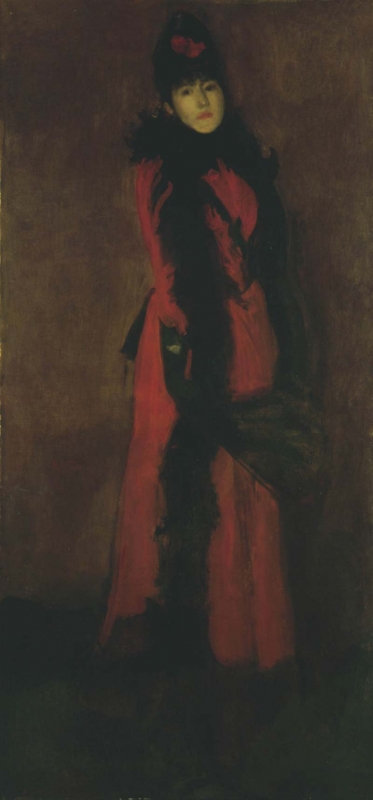Home > Catalogue > Browse > Red and Black: The Fan << >>
Composition
It has been suggested that Sketch for a Portrait of Miss Ethel Philip [YMSM 386] and Sketch of Miss Ethel Philip [YMSM 387] may be studies related to Red and Black: The Fan. In both cases the pose of her head is similar, but the dress is different.
It is very difficult to be absolutely sure which of the portraits of Ethel Whibley was the one that E. G. Kennedy saw Whistler repainting, shortly after the death of Beatrice Whistler in 1896. Kennedy's disastrous visit to the studio is described in a series of letters and notes in his letter-books in New York Public Library. Kennedy noted:
'There was something to do to the hands of each. One afternoon I went to the studio in Fitzroy St & [saw] Mrs Whibley [posing] for the full length in pink, but Whistler, instead of finishing the hand only, had repainted the picture from top to bottom & the beautiful tone had, of course, disappeared. In my astonishment I said - ["]Good Lord you've spoiled my picture".' 1
Kennedy then apologised – grovelled is probably the better word – and left the studio. Whistler then wrote to him: 'I ... release you from all further entanglement in that unfortunate work ... were it by a miracle to turn out a masterpiece it would be immoral to let you have it.' 2
Technique
It was painted on a fine linen canvas and lined with similar canvas. The canvas had pale grey (lead white and ivory black) priming.
This is the most striking of Whistler's portraits of Ethel, with its dramatic combination of red and black, and very free brushwork. It is painted very thinly, with the black paint dripping down the shadows, and over the red dress around the hem. Both the background and the dress were washed in with a duller, darker, red ochre shade, applied over a thin, dark imprimatura. The red was applied last and therefore not rubbed or wiped down, though some of the sash was applied wet-on-wet. 3
The painting was scraped and rubbed down and reworked over several years as Whistler sought to achieve an overall unity of colour and finish. It remained in Whistler's studio, and was considered unfinished by his ward and executrix when she lent it to the 13th Exhibition, Royal Society of Portrait Painters, London, 1903 (cat. no. 4) as 'Rouge et Noir – L'Eventail (unfinished)'.
Conservation History
It was cleaned, relined, retouched, and revarnished by Harry Woolford by December 1970. Joyce H. Townsend and Steven Hackney prepared a condition report in 1994, as did Clare Meredith in 2001. 4 Minor abrasions (some due to the artist's actions) and small areas of paint loss have been retouched inconspicuously; the painting is in sound condition, despite its complex history.
Frame
213.2 x 114.7 x 7.2 cm.
Notes:
1: Note dated 6 September 1903, in Letterbook II/96, New York Public Library, with Whistler's letter to Kennedy of [28 June 1896], GUW #09761.
2: Whistler to E. G. Kennedy, [28 June 1896], GUW #09761.
3: Dr Joyce H. Townsend, Tate Britain, Report of Examination, June 2017.
4: Condition report by Clare Meredith, 21 May 2001, Hunterian files.
Last updated: 2nd June 2021 by Margaret









